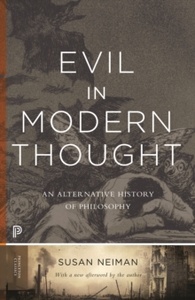Evil in Modern Thought

Editorial Princeton
Fecha de edición agosto 2015 · Edición nº 1
Idioma inglés
EAN 9780691168500
408 páginas
Libro
encuadernado en tapa blanda
Dimensiones 134 mm x 211 mm
Resumen del libro
Evil threatens human reason, for it challenges our hope that the world makes sense. For eighteenth-century Europeans, the Lisbon earthquake was manifest evil. Today we view evil as a matter of human cruelty, and Auschwitz as its extreme incarnation.
Examining our understanding of evil from the Inquisition to contemporary terrorism, Susan Neiman explores who we have become in the three centuries that separate us from the early Enlightenment. In the process, she rewrites the history of modern thought and points philosophy back to the questions that originally animated it. Whether expressed in theological or secular terms, evil poses a problem about the world's intelligibility.
It confronts philosophy with fundamental questions: Can there be meaning in a world where innocents suffer? Can belief in divine power or human progress survive a cataloging of evil? Is evil profound or banal? Neiman argues that these questions impelled modern philosophy. Traditional philosophers from Leibniz to Hegel sought to defend the Creator of a world containing evil. Inevitably, their efforts--combined with those of more literary figures like Pope, Voltaire, and the Marquis de Sade--eroded belief in God's benevolence, power, and relevance, until Nietzsche claimed He had been murdered.
They also yielded the distinction between natural and moral evil that we now take for granted. Neiman turns to consider philosophy's response to the Holocaust as a final moral evil, concluding that two basic stances run through modern thought. One, from Rousseau to Arendt, insists that morality demands we make evil intelligible.
The other, from Voltaire to Adorno, insists that morality demands that we don't. Beautifully written and thoroughly engaging, this book tells the history of modern philosophy as an attempt to come to terms with evil. It reintroduces philosophy to anyone interested in questions of life and death, good and evil, suffering and sense.
Featuring a substantial new afterword by Neiman that raises provocative questions about Hannah Arendt's take on Adolf Eichmann and the rationale behind the Hiroshima bombing, this Princeton Classics edition introduces a new generation of readers to this eloquent and thought-provoking meditation on good and evil, life and death, and suffering and sense.
Biografía del autor
x{0026}lt;P x{0026}lt;B Susan Neimanx{0026}lt;/B (Atlanta, 1955) es una filósofa y escritora estadounidense. Neiman estudió Filosofía en Harvard y en la FU Berlín y posteriormente ejerció como profesora de filosofía en las universidades de Yale y Tel Aviv. Actualmente, dirige el Foro Einstein de Postdam (Alemania) y escribe artículos culturales y políticos para medios de Estados Unidos, Alemania y Gran Bretaña. La obra de Neiman demuestra que la filosofía es una fuerza viva para el pensamiento y la acción contemporáneos.x{0026}lt;/P








